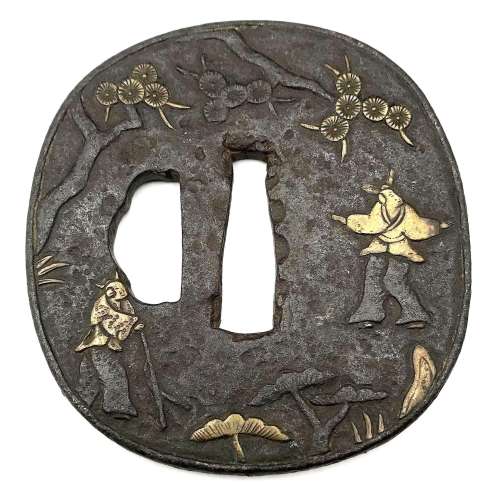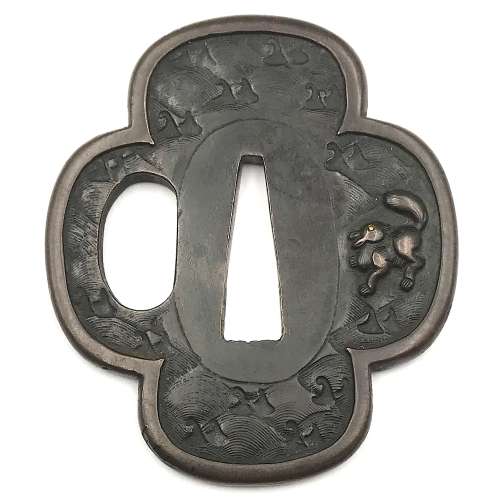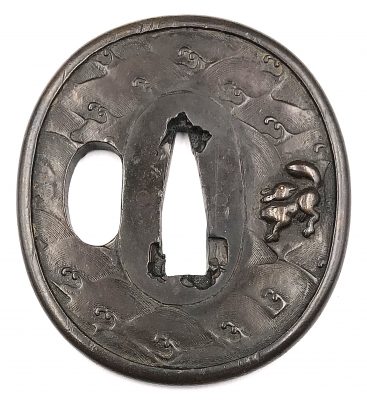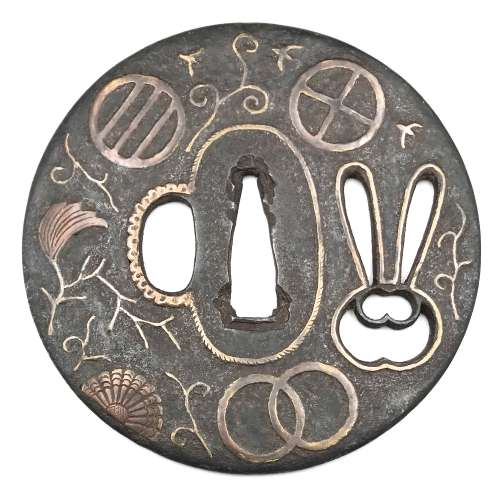-
 Relatively thick iron tsuba of rounded square form with slightly elevated rim decorated in carving (sukidashi-bori) and yellow brass (shinchū) inlay (suemon-zōgan) with legendary creatures (humans with cow heads) in a pine tree forrest on the face, and a horned man with a stick hunting a rabbit in the woods on the reverse. Large hitsu-ana possibly cut off later on. In the beginning of the 20th century such tsuba were usually attributed to Fushimi-Kaga school. This one may be attributed to either Ōnin or to Heianjō. The latter seems most plosible because of the thick web and dull patina. The technique may also be called "shinchū-zōgan". Momoyama or early Edo period. Unsigned. Dimensions: 72.3 x 68.4 x 4.1 mm
Relatively thick iron tsuba of rounded square form with slightly elevated rim decorated in carving (sukidashi-bori) and yellow brass (shinchū) inlay (suemon-zōgan) with legendary creatures (humans with cow heads) in a pine tree forrest on the face, and a horned man with a stick hunting a rabbit in the woods on the reverse. Large hitsu-ana possibly cut off later on. In the beginning of the 20th century such tsuba were usually attributed to Fushimi-Kaga school. This one may be attributed to either Ōnin or to Heianjō. The latter seems most plosible because of the thick web and dull patina. The technique may also be called "shinchū-zōgan". Momoyama or early Edo period. Unsigned. Dimensions: 72.3 x 68.4 x 4.1 mm -
 Ko-kinko ymagane cast tsuba of mokko form (kirikomi-mokkō-gata) with chiseled diaper pattern of double head waves on both sides and a rabbit cast and carved with its eye inlaid in yellow metal (gold or brass) on the face. Fukurin which holds together the sandwiched layers of metal (sanmai) is about 2.4 mm wide. A look-a-like tsub of oval form instead of mokko-gata is illustrated at Robert E. Haynes's Catalog #3,1982 on page 11, lot 15: "Rare design in style of Sanmai (three layers) / Wasei work. With yamagane core and heavy rim cover. The web plates are carved with double head Goto style waves and the face has a fox. The web plates were riveted at the seppadai. See Lot 4, page 8. Ca. 1350. Ht. 6.6 cm, th. 3 mm" [underscore mine]. Quality of photo is so poor that I decided not to provide it here. Muromachi (if we follow Robert) or Momoyama period. The Momoyama attribution is mostly based on a fact that "waves and rabbit" motif became most popular in Momoyama times. Size: 68.5 x 59.8 x 4.0 mm. NBTHK Certificate № 423120. This tsuba is listed at Yakiba website with the following passage: "Attributions as well as dating of this type of tsuba has been the subject debate over the years. There are those who believe these type of tsuba to be ko-Mino (early Mino School) tsuba, others believe them to be tachi-kanaguchi tsuba. Still others insist they are simply ko-kinko (early soft metal) tsuba. This tsuba was authenticated and determined to be "Ko-Kinko" by the NBTHK". Oval form tsuba with the same design can be found in this collection - TSU-0323.
Ko-kinko ymagane cast tsuba of mokko form (kirikomi-mokkō-gata) with chiseled diaper pattern of double head waves on both sides and a rabbit cast and carved with its eye inlaid in yellow metal (gold or brass) on the face. Fukurin which holds together the sandwiched layers of metal (sanmai) is about 2.4 mm wide. A look-a-like tsub of oval form instead of mokko-gata is illustrated at Robert E. Haynes's Catalog #3,1982 on page 11, lot 15: "Rare design in style of Sanmai (three layers) / Wasei work. With yamagane core and heavy rim cover. The web plates are carved with double head Goto style waves and the face has a fox. The web plates were riveted at the seppadai. See Lot 4, page 8. Ca. 1350. Ht. 6.6 cm, th. 3 mm" [underscore mine]. Quality of photo is so poor that I decided not to provide it here. Muromachi (if we follow Robert) or Momoyama period. The Momoyama attribution is mostly based on a fact that "waves and rabbit" motif became most popular in Momoyama times. Size: 68.5 x 59.8 x 4.0 mm. NBTHK Certificate № 423120. This tsuba is listed at Yakiba website with the following passage: "Attributions as well as dating of this type of tsuba has been the subject debate over the years. There are those who believe these type of tsuba to be ko-Mino (early Mino School) tsuba, others believe them to be tachi-kanaguchi tsuba. Still others insist they are simply ko-kinko (early soft metal) tsuba. This tsuba was authenticated and determined to be "Ko-Kinko" by the NBTHK". Oval form tsuba with the same design can be found in this collection - TSU-0323.
TSU-0323. Ko-kinko yamagane tsuba with waves and rabbit motif.
-
 Iron tsuba of round form with design of rabbit (usagi) in openwork (sukashi) and inlaid with designs of plants and family crests (mon) in suemon-zōgan. A branch with lonely leaf, half chrysanthemum, and flying wild geese on the face represent autumnal connotations. The same motif is complemented by a clove (choji) on the reverse. The family crests (mon) include: interlocked rings (kanawa; wachigai), three encircled lines or stripes (hikiryo), bit or muzzle (kutsuwa - horse's harness element with possible christian symbolism), and encircled triangle (uroko, fish scale). Brass wire trim around the openwork elements and the seppa-dai, scalloped wire inlay around the hitsu-ana. Iron is dark, almost black. Brass or copper elements vary in shades of lighter and darker yellow with red-ish hue. Ōnin school. Late Muromachi period, 16th century. Height: 89.6 mm; Width: 89.3 mm; Thickness at seppa-dai: 3.0 mm. Weight: 129.7 g.
Iron tsuba of round form with design of rabbit (usagi) in openwork (sukashi) and inlaid with designs of plants and family crests (mon) in suemon-zōgan. A branch with lonely leaf, half chrysanthemum, and flying wild geese on the face represent autumnal connotations. The same motif is complemented by a clove (choji) on the reverse. The family crests (mon) include: interlocked rings (kanawa; wachigai), three encircled lines or stripes (hikiryo), bit or muzzle (kutsuwa - horse's harness element with possible christian symbolism), and encircled triangle (uroko, fish scale). Brass wire trim around the openwork elements and the seppa-dai, scalloped wire inlay around the hitsu-ana. Iron is dark, almost black. Brass or copper elements vary in shades of lighter and darker yellow with red-ish hue. Ōnin school. Late Muromachi period, 16th century. Height: 89.6 mm; Width: 89.3 mm; Thickness at seppa-dai: 3.0 mm. Weight: 129.7 g.


